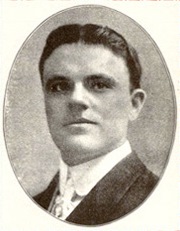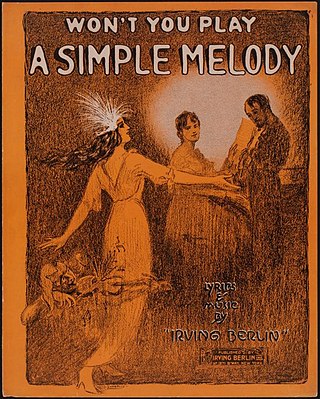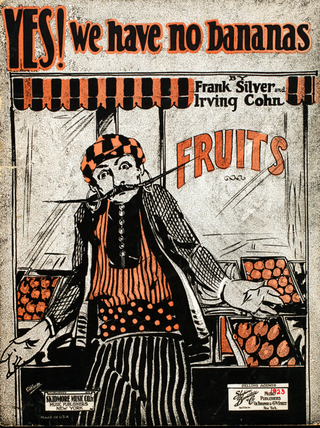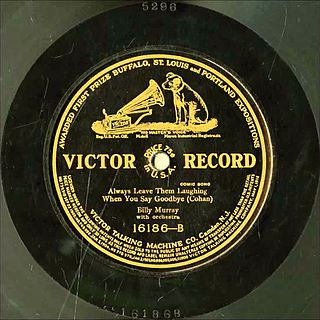
William Thomas Murray was one of the most popular singers in the United States in the early 20th century. While he received star billing in Vaudeville, he was best known for his prolific work in the recording studio, making records for almost every record label of the era. Murray was the best-selling recording artist of the first quarter of the 20th century, selling over 300 million records during the phonograph era.

"It's a Long Way to Tipperary" is an English music hall song first performed in 1912 by Jack Judge, and written by Judge and Harry Williams, though authorship of the song has long been disputed.
"Pretty Baby" is a song written by Tony Jackson during the Ragtime era. The song was remembered as being prominent in Jackson's repertory before he left New Orleans in 1912, but was not published until 1916.
"Hesitation Blues" is a popular song adapted from a traditional tune. One version was published by Billy Smythe, Scott Middleton, and Art Gillham. Another was published by W.C. Handy as "Hesitating Blues". Because the tune is traditional, many artists have taken credit as writer, frequently adapting the lyrics of one of the two published versions. Adaptations of the lyrics vary widely, though typically the refrain is recognizably consistent. The song is a jug band standard and is also played as blues and sometimes as Western swing. It is cataloged as Roud Folk Song Index No. 11765. Composer William Grant Still arranged a version of the song in 1916 while working with Handy.

"Play a Simple Melody" is a song from the 1914 musical, Watch Your Step, with words and music by Irving Berlin. The show was the first stage musical that Berlin wrote. It ran for 175 performances at the New Amsterdam Theater in New York City. The one song from the show that is well-remembered today is "Play a Simple Melody," one of the few true examples of counterpoint in American popular music — a melody running against a second melody, each with independent lyrics. In the printed music, first the "simple melody" plays alone. Then comes the contrasting melody. Finally, the two play together. The lyrics of "Play a Simple Melody" also track the counterpoint duet in that one singer yearns for the music which mother sang, but the other singer disdains such classic fare as lacking interest and rhythm. When "Play a Simple Melody" was published, ragtime was in its heyday, led by its most consummate composer, Scott Joplin. In a famous 1916 recording of the song, while Elsie Baker wants what she considers simplicity, Billy Murray explicitly asks for "rag". The song was also recorded by Walter Van Brunt and Mary Carson in 1915.

"Under the Anheuser Bush" is a beer garden song commissioned by the Anheuser-Busch brewing company in 1903. With music by Harry Von Tilzer and words by Andrew B. Sterling, the title contains a pun on the surnames of the company's founders.

"Yes! We Have No Bananas" is an American novelty song by Frank Silver and Irving Cohn published March 23, 1923. It became a major hit in 1923 when it was recorded by Billy Jones, Billy Murray, Arthur Hall, Irving Kaufman, and others. It was recorded later by Benny Goodman and His Orchestra, Spike Jones & His City Slickers, Kidsongs, and many more.
"Charley, My Boy" is a song with music by Ted Fio Rito and lyrics by Gus Kahn. The Russo-FioRito Oriole Orchestra introduced the song in 1924. The most popular recording was released by Eddie Cantor. The sheet music was published for voice and piano by J. Albert & Son.
"Good Evening, Caroline" is a 1908 popular song, written by Albert Von Tilzer and Jack Norworth. The singer Billy Murray made at least two recordings of the song: one from 1908 on Edison Records, and one in 1909 on Indestructible Record Company. The 1909 recording became one of the most popular recordings of its year. Murray's versions are the most commonly heard today.

"Ain't It Funny What a Difference Just a Few Hours Make" is a popular song, introduced in the 1904 Broadway show The Yankee Consul, and briefly becoming a standard.
"He Goes to Church on Sunday" is a popular song published in 1907 with lyrics by Vincent Bryan and music by E. Ray Goetz. It was first introduced by Eddie Foy in the Broadway production of the musical comedy The Orchid. The song tells the stories of men who defraud people, but are considered honest because they go to church on Sundays. However, the song doesn't appear to be a criticism of religion, and the tone of the song is humorous and light-hearted.
I'm Afraid to Come Home in the Dark is popular song, written by Egbert Van Alstyne and Harry Williams in 1907, and made famous by Billy Murray. Today it is popular among collectors of cylinder recordings. Billy Murray recorded the song on several record labels, including Edison Records in 1908. This version is now in the public domain.

"In the Land of the Buffalo" is a popular song, first published in 1907. The chorus:

"Any Little Girl, That's a Nice Little Girl, Is the Right Little Girl for Me" is a popular song, first published in 1910, and written by Thomas J. Gray and Fred Fisher. Although largely forgotten today, a 1911 recording of the song by Billy Murray on Zon-O-Phone Records survives, and is widely accessible because the recording has entered the public domain. It was also featured in a Max Fleischer "Follow the Bouncing Ball" sing-a-long animated cartoon in the early 1930s. The song appears on the soundtrack of the 1933 film Stage Mother. Subsequently, in 1938 it was recorded for Bluebird Records by Shep Fields and his orchestra, with the accordionist John Serry Sr.

"Always Leave Them Laughing When You Say Goodbye" was a popular song, first published in 1903, and written by George M. Cohan. Today, the best known recording of the song is by Billy Murray, which was recorded in 1907 with Victor Records, and whose version has entered the public domain. Although very popular in the early 20th century, the song is almost completely forgotten today.

Bon Bon Buddy (The Chocolate Drop) is a popular song, first published in 1907, with lyrics by Alex Rogers and music by Will Marion Cook. It was introduced in the 1908 musical Bandanna Land. Today the best-known versions of the largely forgotten song are by Billy Murray, who recorded versions in 1908 on both Victor Records and Indestructible Records.
Clap Hands! Here Comes Charley! is a popular song that was written by Billy Rose, Ballard MacDonald and Joseph Meyer and was first published in 1925. The song was recorded by several popular singers of the era, including a version by Billy Murray in 1925, but the most popular version at that time was by Johnny Marvin. In the 1930s the song became the theme tune of British dance band pianist Charlie Kunz. In the 1960s, the song was used to promote Hormel chili, as in, "Clap hands, here comes chili...".
"College Life" is a popular song, first published in 1905 and written by Hery Frantzen. Today the most well-known version is by Billy Murray, who recorded a 1906 version for Victor Records which has entered the public domain.
Dear Sing Sing is a popular song, words by William Jerome, music by Jean Schwartz, first published in 1903. A popular singer of the time named Billy Murray recorded at least two versions in 1904, one for Edison Records and another for Victor Records. Both of these recordings are now public domain, and can be downloaded at several websites.

"Ice Cream" or "I Scream, You Scream, We All Scream for Ice Cream" is a popular song, first published in 1927, with words and music by Howard Johnson, Billy Moll, and Robert A. King. After initial success as a late 1920s novelty song, the tune became a traditional jazz standard, while the lyrics refrain "I Scream, You Scream, We All Scream for Ice Cream" has remained a part of popular culture even without the rest of the song.









